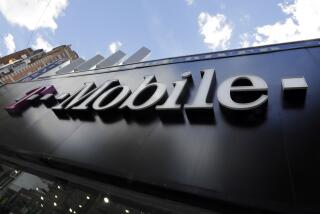Start-Up Firm to Offer Free DSL Service in Ad Trade-Off
Jumping on the “free technology” bandwagon, a Newport Beach start-up company will offer free high-speed Internet access April 1, becoming the first to provide digital subscriber line service to consumers at no cost.
But the advertiser-supported offer by the 4-month-old Broadband Digital Group comes with a host of qualifiers that make its business strategy questionable, industry experts said.
In exchange for free DSL service, consumers must give out personal information, which will be sold to advertisers. Customers also must get 10 other people to sign up for the company’s free service.
Even then, Broadband Digital won’t guarantee that customers will get the DSL service right away. Technical limitations may prevent it from being implemented in some areas for as long as two years.
In addition, the company will give customers a DSL modem, but won’t guarantee that it “will be satisfactory to access the Internet services provided by BDG,” according to documents posted on its Web site.
“It sounds great on the surface, but who’s going to go for this?” said Peter Meade, a managing partner with the market research firm TeleResearch Inc., in Carlsbad, Calif. “It’s like the old days of long-distance ‘friends and family’ plans. You remember how angry people got over that?”
The service, called FreeDSL, is being launched by brothers Ryan and Chad Steelberg, who built the Internet advertising service AdForce. That company was acquired last September by CMGI Inc. of Massachusetts for $500 million. The Steelbergs had left the company several months earlier.
Ryan Steelberg, Broadband’s 26-year-old chief executive, said he is modeling his new company after the cell phone industry: offering a free product to entice people to sign up for a service.
Industry experts said there aren’t enough people using DSL service to allow a business model that relies solely on advertising revenue to work.
“Most advertisers are looking for mass audiences,” said Eric Moyer, senior product manager for Covad Communications Group Inc., a leading DSL service provider in Santa Clara, Calif. “We’re not looking at 50% of the population. We’re talking about several hundred thousand people.”
Nationwide, there are 500,000 DSL customers, most served by phone carriers such as Pacific Bell, BellSouth and US West. An additional 2 million consumers get high-speed Internet access through cable TV lines, according to Forrester Research.
Broadband Digital officials declined to provide revenue projections or say when they thought the company would become profitable. The company hopes to sign up half a million customers by April 1.
The company faces a slew of competitors who are charging for DSL service. Fast-growing upstarts such as Covad, Rhythms NetConnections Inc. of Englewood, Colo. and NorthPoint Communications Group Inc. of San Francisco are in a heated race with the Baby Bell phone companies and cable television operators to provide customers with high-speed Internet access.
“This [FreeDSL] thing is such a typical Internet play,” said Kathie Hackler, an analyst with the research firm Dataquest. “You come up with a wacky idea, try it out, and hey, you never know what’s going to work--or what people will try to sell.”
Giving away stuff for free--whether it’s e-mail, PCs or dial-up Internet service--has become a big but mostly unprofitable business. Spurred by intense competition for Web surfers, the occasional come-on of a few years ago has exploded into a commercial strategy.
DSL service packs data into existing copper wire lines more efficiently than traditional telephone dial-up modem connections and can be as much as 28 times faster.
It costs the telecommunication and Internet service providers hundreds of millions of dollars to get the hardware and build the networks needed to provide such service. Such companies rely on subscriber fees--which range between $40 and $50 per consumer--to offset some of these costs.
In addition, there are added costs to providing DSL service to residential customers. Because phone companies have copper lines wired to neighborhoods, most rival DSL carriers must pay to lease space on those lines.
Broadband Digital doesn’t have any DSL equipment of its own. Instead, it plans to lease equipment from other companies in order to roll out its service.
Steelberg said it will cost about $100 to link a customer to the service and $20 to $30 a month to maintain it. The plan is for revenue from advertisers to offset these costs.






